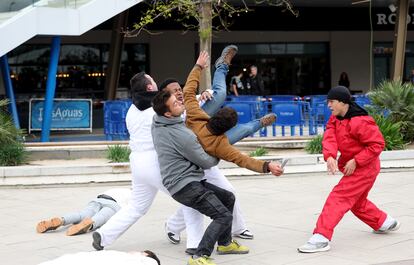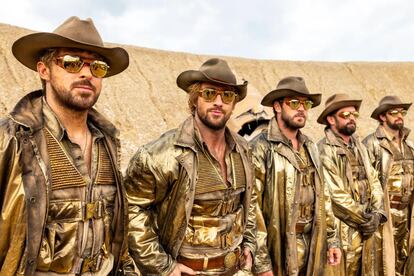When I was little, Cuckoo Usin He played “guns.” Like millions of children of the seventies. Hiding, chasing, bang, bang! Although the little boy had a very personal aspiration: “Everyone said: ‘You didn’t give it to me!’. They always hit me, what I wanted was to die.” Figuratively speaking, he understands himself. And it continues. Today, at 50 years old, he believes that this is where his vocation first appeared. The one that causes him falls, bruises or a few car hits every day. And, despite or because of it, he makes him happy. It is the same passion that took Alejandro Bertero out of his engineering career, to get him on a motorcycle hurtling towards an inevitable impact. Or that it makes Estefanía Martínez’s blood burn, but also her clothes, every time she burns like hell.
They usually star in the most unforgettable sequences in an action movie. However, the public will never applaud them. It is the curse of specialists. Although one thing is that viewers are not going to identify them on the screen. Or attribute their exploits to others. That’s what it’s all about, after all. But it is quite another matter that the sector does not recognize them either. The recent premiere of The specialistby David Leitch, who has gone behind the camera to focus, for once, on his own profession.
It is impossible for them to win an Oscar or a Goya, since there is no category in which to nominate them. Precisely one of the changes, on the other hand, that champions Leitch’s film. In Spain, the Film Academy currently only accepts them as associate members: Usín says that he was the first to enter. And they are not even protected by a collective agreement or a union. Those interviewed say that safety has reduced the greatest dangers of their job. Today they are often protected by ropes, cables, mats, rubber bands. What they fail are the papers. So their fear is nested in the lack of job protection. And the precariousness.
“Right now we don’t exist,” Bertero highlights. “When I say I’m a specialist, they ask me: ‘What? Cooking, biology?”, summarizes Martínez. The real answer would be very long. Because courses and training prepare them for endless disciplines: horses, diving, climbing, cars, motorcycles, parkour, freediving, weapons… As many spectacular sequences as there can be in a film. “The more you know, the better,” says Ángel Plana, one of the pioneers and founder from the first training school, which was later followed by a few more. A specialist even has to be able to run in a sequence where the star is wearing heels or make a golf move, he points out.
Although, as in any other sector, everyone has their preferences. And the boom of action productions, encouraged by digital platforms, pushes them to specialize more, according to Usín. He made “a hole” for himself by being hit by vehicles, although today he also drives them and skids, or falls with art and (if possible) without scratches. Bertero is good at crashing on two wheels. Martínez, on one occasion, had to jump down a ladder 25 times. Everything needs specialists today, even the series The lawyersabout Manuela Carmena and Cristina Almeida, where the double of Aitana or Ingrid García-Jonsson led a team of 40 people.
“It is very sacrificed and you have to train a lot. You always have bruises, wounds… you can’t paint your nails either,” adds she, one of the first and only women to make her way in the sector in Spain. Then there is the risk. Getting smaller, it seems. By dint of tests, measures, safety equipment and jobs such as the coordinator of specialists that have been added. Never, however, null. “You work with a higher pain threshold. I don’t mind taking a strong kick to the chest, what you avoid is the injury,” says Bertero. Although he also clarifies: “I don’t think the bricklayer who works 12 hours goes home less sore.”
Bruises and blows are the order of the day. Apparently, they are perceived as part of the job, its silent price. The headlines, however, go to serious accidents, such as the two deaths on the set of Deadpool 2 and The Walking Dead in 2017, or the hospitalization of eight members of the crew that filmed The Pickup in Atlanta on April 20. And, with them, the feeling that the specialist is constantly risking his life. Those interviewed assure that incidents increasingly represent exceptions. Although they happen. “Many times psychological recovery is equally difficult as physical recovery. Last year I broke my shoulder in a car accident. When someone gets hurt with something they try not to go back to the same place. “You get just the opposite,” Bertero recalls.
Some risk is reduced with skill and trial. Another, with the measurements of the set itself. “If they don’t give me security during filming, I won’t do the scene. Improvisation is not worth it,” Martínez says. “You have to have some control, know what you want to do and how. Every time they ask me about the most dangerous thing in my career, I answer two sequences that I was not prepared to do,” Usín argues. The budget helps and it shows. Blockbusters like the sagas of Terminator, 007 either Indiana Jones, where the interviewees worked, have supervisors and coordinators and care about their well-being. In smaller films, however, they feel more exposed to adversity. “I would like everything I crash into to be prepared, but sometimes it’s not like that,” explains Bertero. Hence, taking care of yourself is essential.
“He who seeks limits ends up hurting himself. On a shoot you normally have a margin of 20-30%. Preparation and your ability can broaden it, hence the security that the next day you can ride somewhere else,” Bertero continues. Although the good specialist must not only train the body. They all admit to having met some “Zumbado” willing to go beyond what is sensible. But Usín emphasizes again and again the importance of mental work. He, specifically, applies meditation and creative relaxation techniques. To concentrate, silence fear. Because everyone can bring other problems to work or have a bad day, although in few professions it coincides with a day of explosions, cartwheels or fires.

“The day I gave birth I was training”
At the same time, satisfaction is often there. “I like to get out of my comfort zone,” says Usín. Another key, deep down, to his job. Bertero cites one of his milestones: flying away after colliding with a motorcycle against a mechanical bull at 70 km/h. And film it all in one take, instead of splitting impact and fall. Martínez, who defines herself as “adrenaline addict,” points out: “The day I gave birth I was training. When I burn I feel complete happiness.” Yet, in some way, they vindicate her profession. And his experience, compared to those directors who make anyone do risky sequences, as Plana denounces.
“Now productions are not conceived without specialists. If we united and became strong, they would jump through hoops. With an agreement the best would work, because there would be regulated prices. If not, the production companies rub their hands and try to scrape even 50 euros, they are not faithful,” adds the veteran. All those interviewed assure that camaraderie dominates their job. How can you not connect with someone on whom, at least for a moment, your life has depended? And yet, at the same time, such brotherhood has not translated into joint union struggle. What has caused the absence of an agreement ad hoc, as the extras did obtain, with the loss of rights that entails. That leaves salaries at levels from 15 years ago, according to Bertero.

Lack of labor protection also goes hand in hand with personal protection. For 30 years, Hollywood has been debating a possible Oscar for best stunt coordinator. Who knows how many sprains, falls, injuries, wounds, flights, jumps, skids, shootings, combats, self-combustions there will have been since then. The idea at the moment has not gone beyond words. In Spain, it has not even reached that point. “You have a leadership of the Academy that decides things where we are not,” Usín laments. “There will never be a Goya for us, because Mario Casas is not going to say: ‘Thanks to the specialist for whom I did that action scene so well for which they gave me the award,’ says Martínez, who is also an actress, ironically.
And the actors do tend to recognize the efforts of those who risk it for them, according to those interviewed. At least, mostly. Divos surrounded by entourages, divisions between actors and doubles, delirious requests from one star or another who struck swords without caution belong to the anecdotes of specialists. But also, and above all, there are the beers with Tom Hanks, the affection with which Usín remembers the sequence in which Brad Pitt killed him in World War Z, or the hours of training side by side with the interpreters. And the respect and trust that arises. At the recent Cannes festival, Anya Taylor-Joy said that stunt people are “the best people on set, always.” Bertero even jokingly called an interpreter, who he prefers not to name, her “text double.”
There are also actors who would like to face the risks firsthand. But, except for the daring and all-powerful Tom Cruise, who produces his films and does what he wants, many times the main negative is economic. The protagonist’s bent ankle means stopping the entire process for several weeks, as the producers of films by Buster Keaton and Charles Chaplin already discovered in the 1920s. The specialist knows that job best. And, in cold monetary terms, his injury matters less.
They have assumed it. Behind the armor that someone has worn in some film from the Middle Ages, his skin has also hardened. Seasoned in too many blows, whether to the back, the wallet or the self-esteem. Bartero remembers a few who left the profession because they couldn’t take it anymore. But many are still there. And what they have left. “I know 70-year-old specialists jumping from horses. Although when you wake up the next day you notice it,” says Usín, who observes with envy and admiration the first steps of his nephew in the sector.
“There are young people who do certain stunts better than me. But I can branch out to other areas. You can easily work until you are 50 or 60 years old,” explains Bertero. With the passage of time, one can redirect oneself towards coordination, or more technical tasks. Although there is also Martínez’s option: “I hope to become an old lady by beating myself up.” By then, he may have finally opted for a Goya. Although, given what we have seen, it is better to avoid predictions. There is too much risk of making a mistake.
All the culture that goes with you awaits you here.
Babelia
The literary news analyzed by the best critics in our weekly newsletter
RECEIVE IT
_




